Abstract
The effects of enalapril, an angiotensin converting enzyme (ACE) inhibitor, on maternal and foetal blood pressure, heart rate and components of the renin-angiotensin-aldosterone system were studied in 9 chronically-cannulated pregnant ewes and their foetuses. Six ewes received 1 mg kg-1 enalapril i.v. while 3 were given 2 mg kg-1. Although the initial fall in blood pressure was slightly greater in the higher dose group, there was substantial overlap of data. The pressor response to angiotensin I, assessing ACE activity, was abolished within 10 min of administration, and did not recover during 3 h of observation. Maternal systolic and diastolic pressures reached a nadir 90 min after administration (P less than 0.001, P less than 0.002 respectively). The maximum tachycardia was seen at 60 min (P less than 0.05). The foetuses of the ewes given 1 mg kg-1 enalapril showed no change in systolic or diastolic blood pressure or heart rate. Those of the ewes given the higher dose showed late-onset hypotension, coincident with the lowest maternal blood pressures. Maternal plasma renin concentration (PRC) had risen significantly by 30 min (P less than 0.02), reaching a maximum at approximately 90 min. Maternal plasma angiotensin II and aldosterone concentrations both fell initially (P less than 0.05) but were almost at basal levels by the end of the experiment. Foetal plasma renin, angiotensin II and aldosterone concentrations were unchanged throughout the experiment. Peak values of enaprilic acid, the active principle, were recorded in maternal plasma 65-90 min after administration of 1 mg kg-1, and 25-30 min after the administration of 2 mg kg-1. A trace amount of the active principle was recorded in the foetal plasma of one lamb, whose mother had been given the higher dose. None was recorded in the plasma from three other lambs. Maternal plasma ACE concentrations fell by an average of 84%; in 4 of the 6 ewes in which concentrations were measured they were undetectable after treatment. Foetal plasma ACE concentrations were unchanged throughout. Enalapril at 1 mg kg-1 thus exerts a depressor effect on the pregnant ewe which is probably related to its blockade of the renin-angiotensin system. Both direct measurement of the drug and foetal observation suggest that it does not cross the sheep placenta at this dose. This is consistent with its failure to cross the blood-brain barrier. Foetal effects were noted at 2 mg kg-1, and there was an unexpected foetal death in this group.
Full text
PDF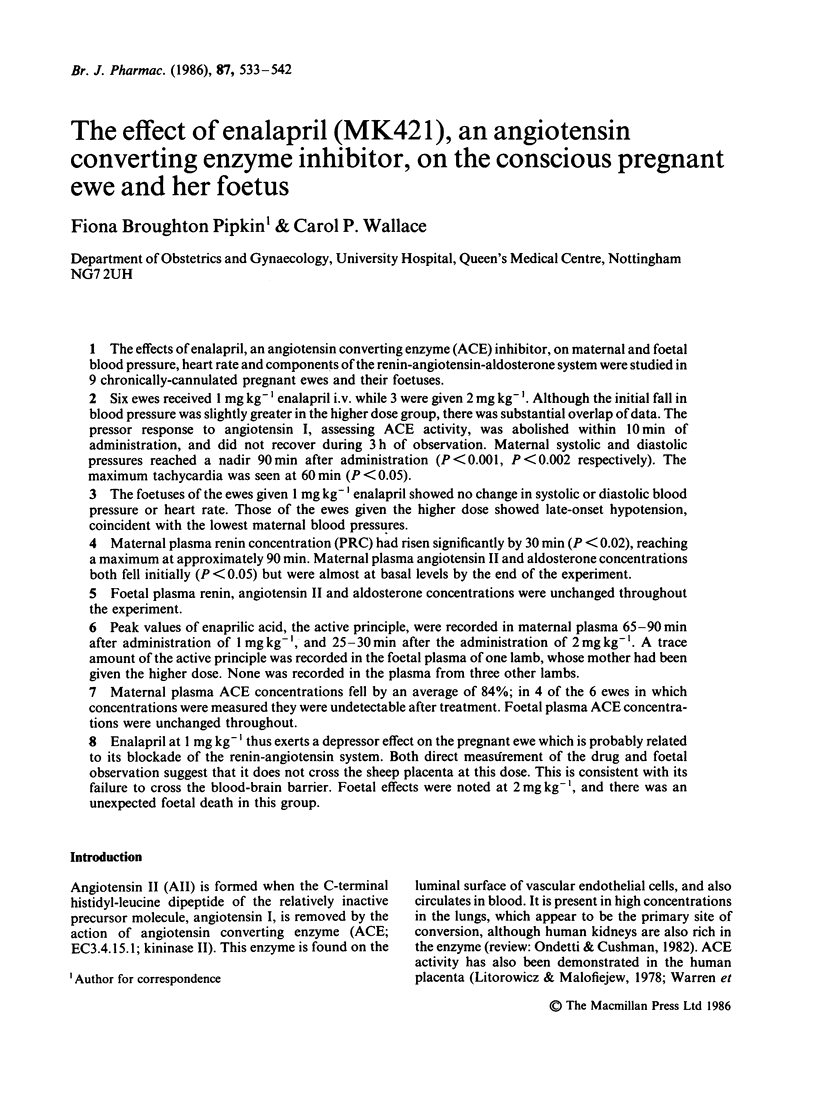
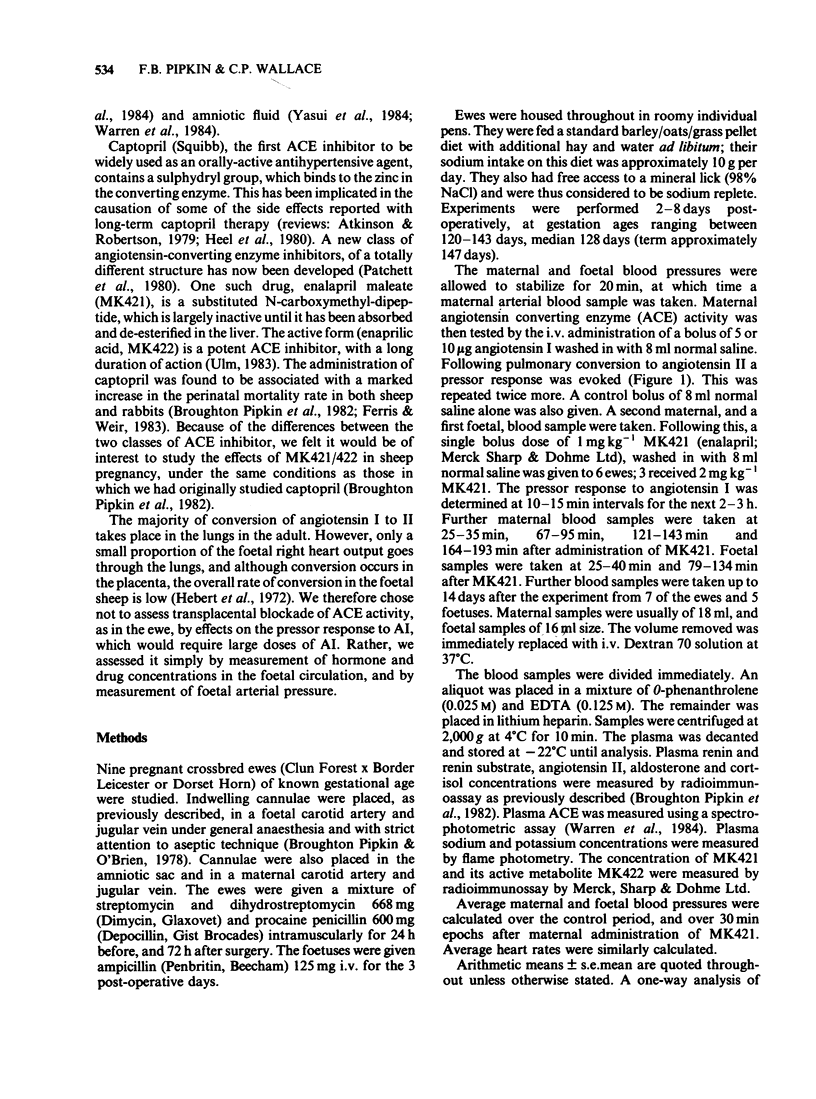
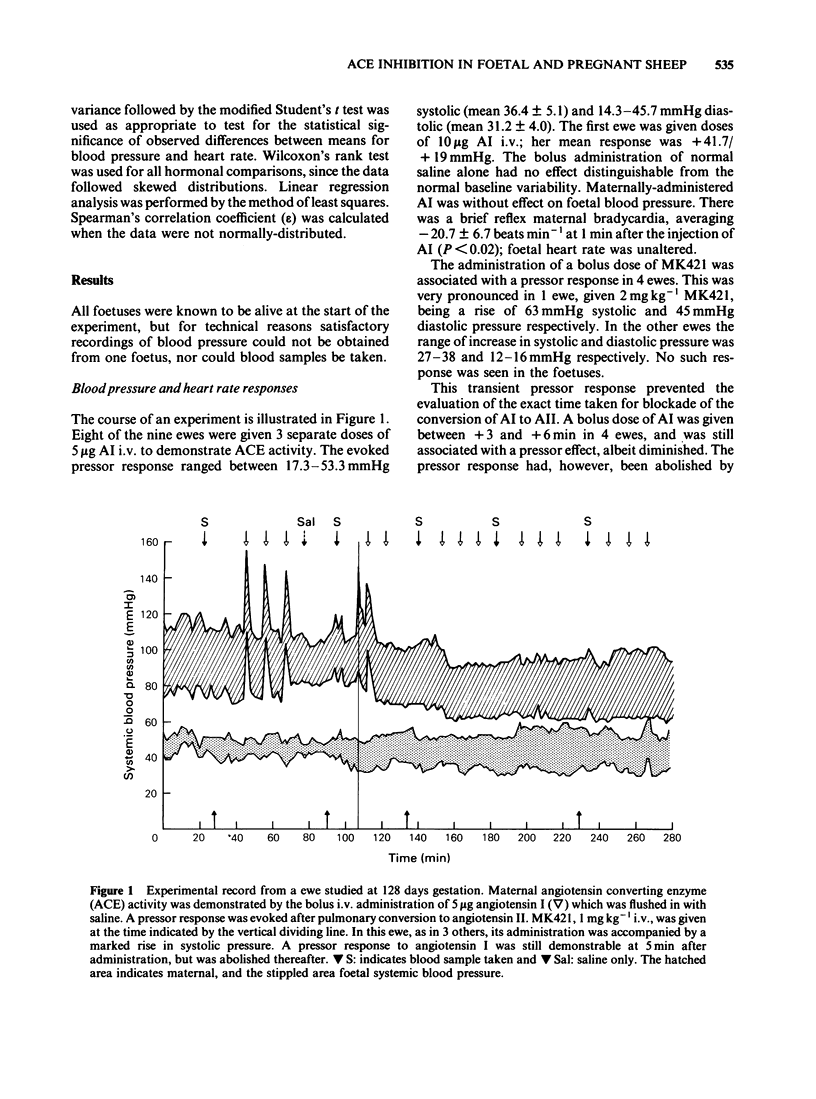
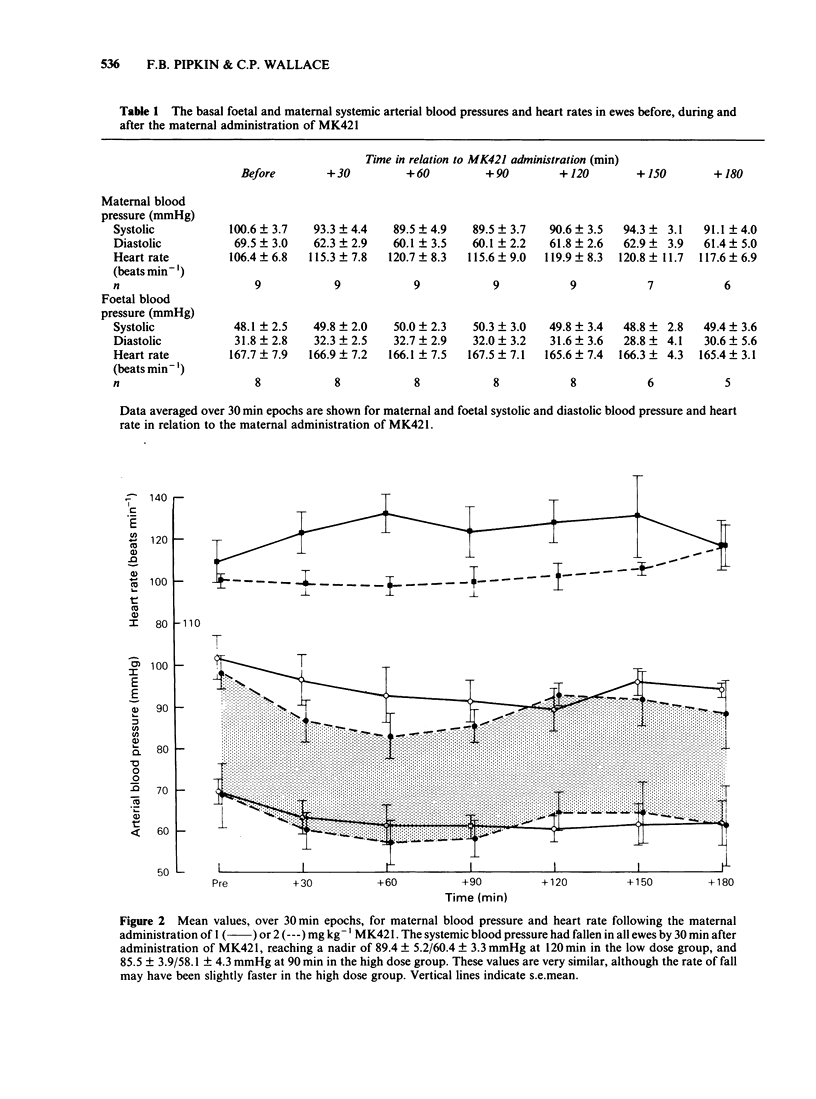
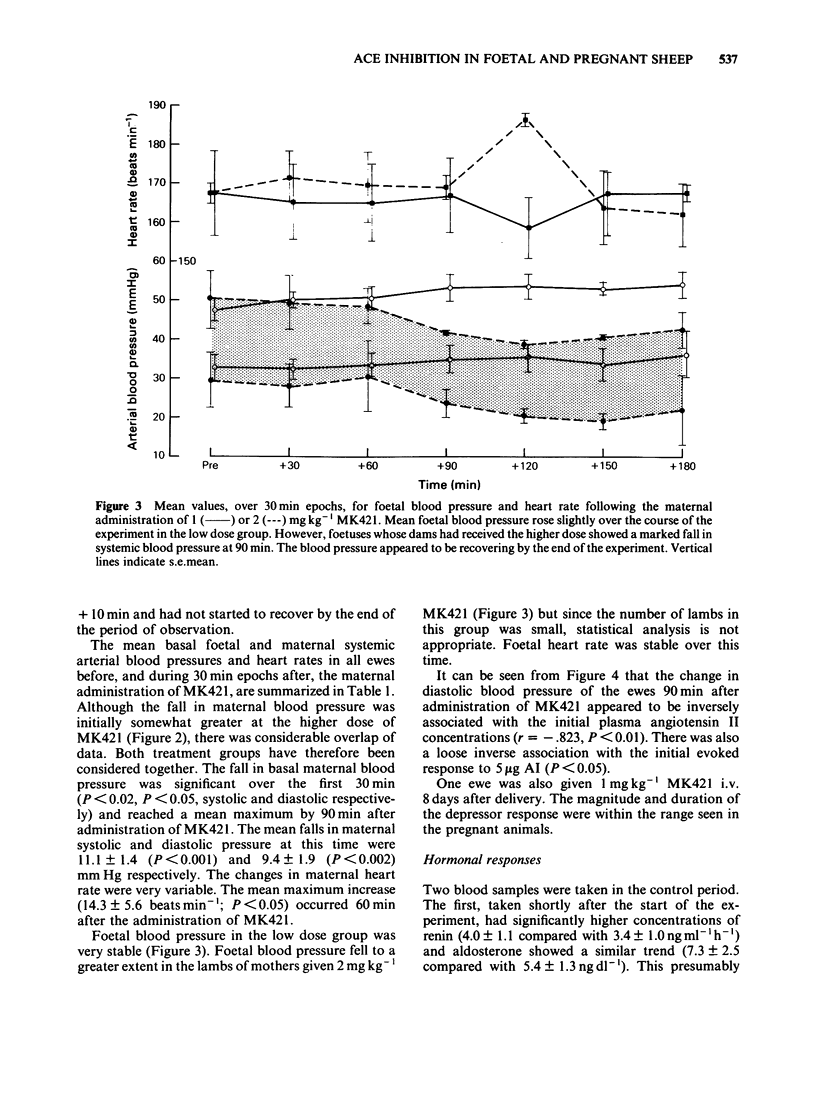
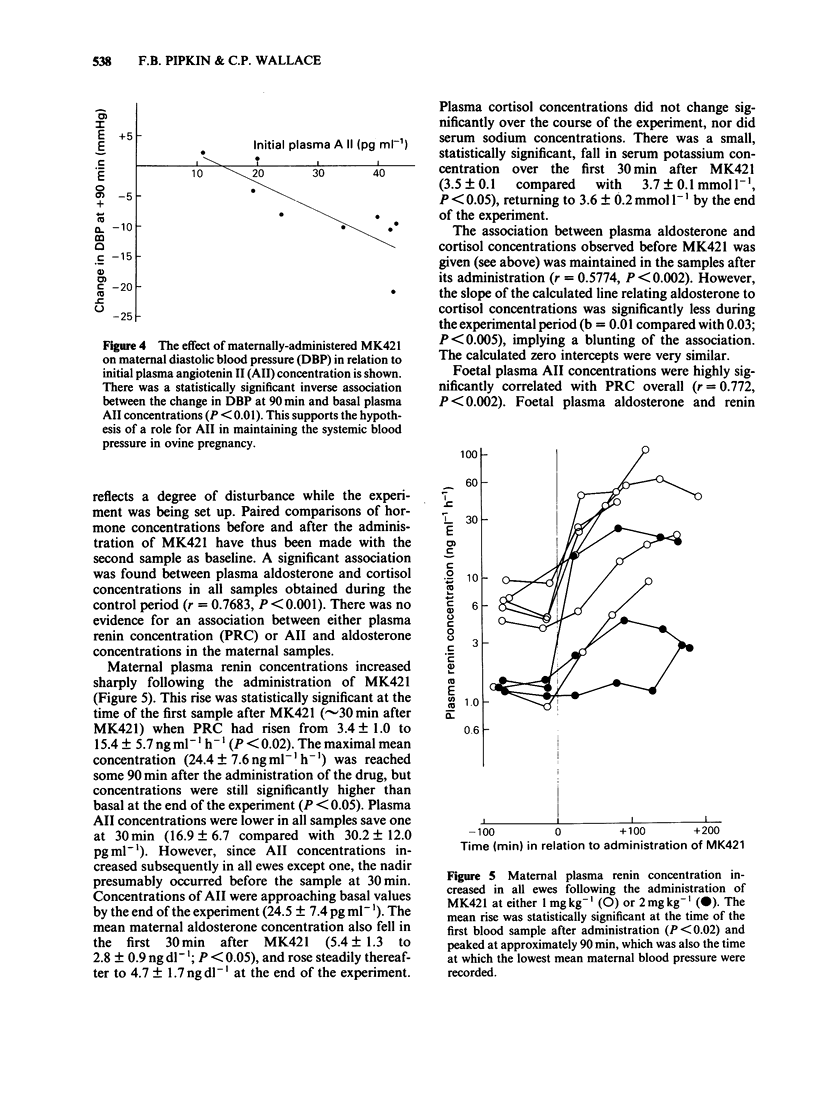
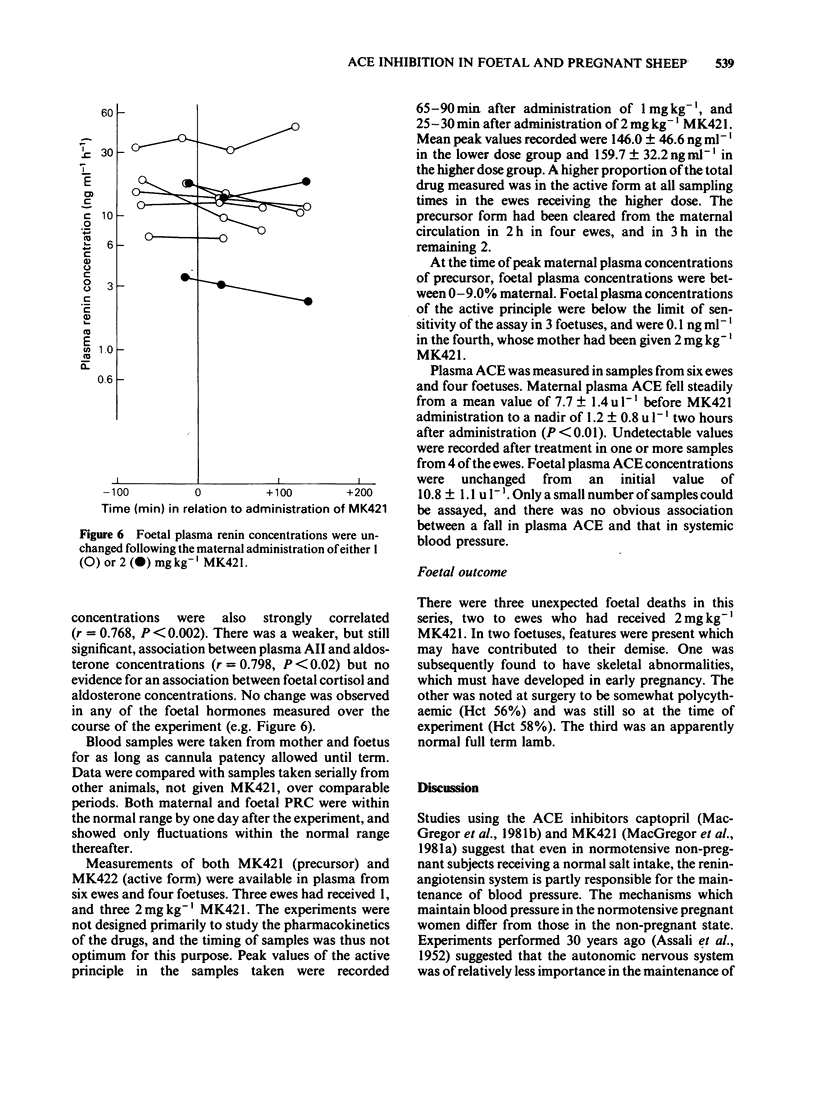
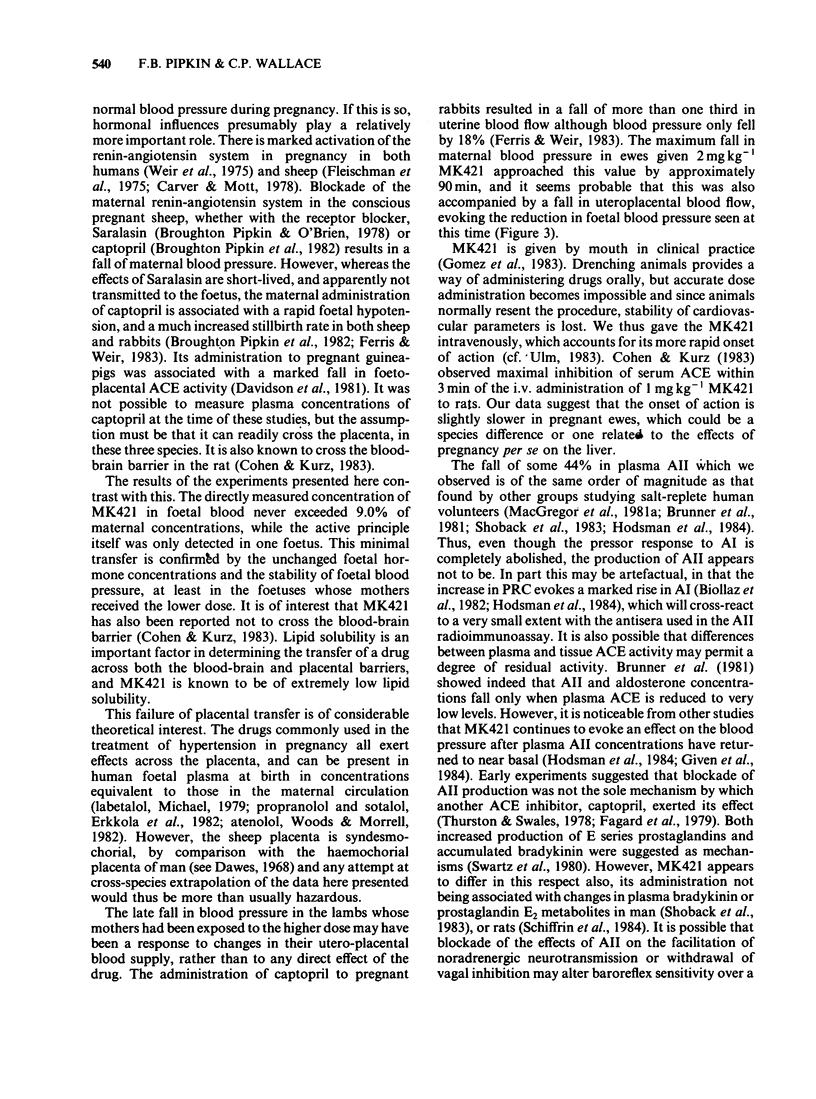
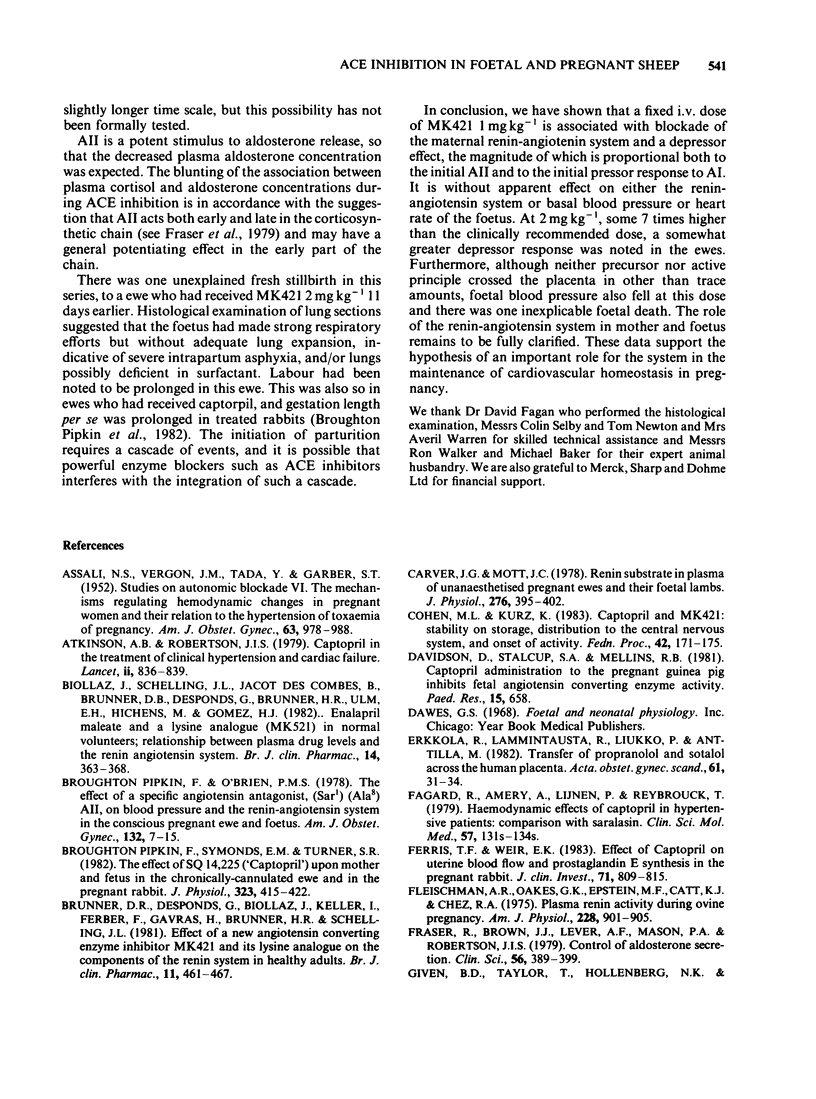
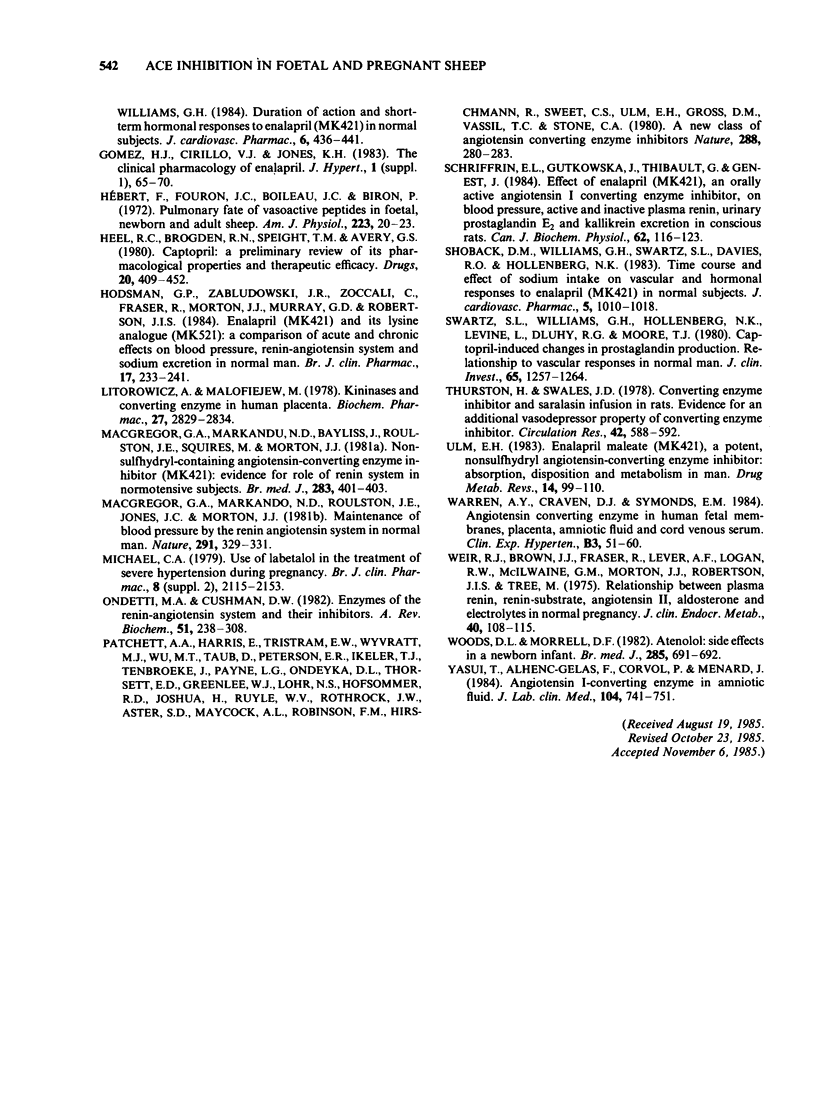
Selected References
These references are in PubMed. This may not be the complete list of references from this article.
- ASSALI N. S., VERGON J. M., TADA Y., GARBER S. T. Studies on autonomic blockade. VI. The mechanisms regulating the hemodynamic changes in the pregnant woman and their relation to the hypertension of toxemia of pregnancy. Am J Obstet Gynecol. 1952 May;63(5):978–988. doi: 10.1016/0002-9378(52)90537-1. [DOI] [PubMed] [Google Scholar]
- Atkinson A. B., Robertson J. I. Captopril in the treatment of clinical hypertension and cardiac failure. Lancet. 1979 Oct 20;2(8147):836–839. doi: 10.1016/s0140-6736(79)92186-x. [DOI] [PubMed] [Google Scholar]
- Biollaz J., Schelling J. L., Jacot Des Combes B., Brunner D. B., Desponds G., Brunner H. R., Ulm E. H., Hichens M., Gomez H. J. Enalapril maleate and a lysine analogue (MK-521) in normal volunteers; relationship between plasma drug levels and the renin angiotensin system. Br J Clin Pharmacol. 1982 Sep;14(3):363–368. doi: 10.1111/j.1365-2125.1982.tb01992.x. [DOI] [PMC free article] [PubMed] [Google Scholar]
- Broughton Pipkin F., O'Brien P. M. Effect of the specific angiotensin antagonist (Sar1) (Ala8) angiotensin II on blood pressure and the renin-angiotensin system in the conscious pregnant ewe and fetus. Am J Obstet Gynecol. 1978 Sep 1;132(1):7–15. doi: 10.1016/0002-9378(78)90790-1. [DOI] [PubMed] [Google Scholar]
- Broughton Pipkin F., Symonds E. M., Turner S. R. The effect of captopril (SQ14,225) upon mother and fetus in the chronically cannulated ewe and in the pregnant rabbit. J Physiol. 1982 Feb;323:415–422. doi: 10.1113/jphysiol.1982.sp014081. [DOI] [PMC free article] [PubMed] [Google Scholar]
- Brunner D. B., Desponds G., Biollaz J., Keller I., Ferber F., Gavras H., Brunner H. R., Schelling J. L. Effect of a new angiotensin converting enzyme inhibitor MK 421 and its lysine analogue on the components of the renin system in healthy subjects. Br J Clin Pharmacol. 1981 May;11(5):461–467. doi: 10.1111/j.1365-2125.1981.tb01151.x. [DOI] [PMC free article] [PubMed] [Google Scholar]
- Carver J. G., Mott J. C. Renin substrate in plasma of unanaesthetized pregnant ewes and their foetal lambs. J Physiol. 1978 Mar;276:395–402. doi: 10.1113/jphysiol.1978.sp012242. [DOI] [PMC free article] [PubMed] [Google Scholar]
- Cohen M. L., Kurz K. Captopril and MK-421: stability on storage, distribution to the central nervous system, and onset of activity. Fed Proc. 1983 Feb;42(2):171–175. [PubMed] [Google Scholar]
- Erkkola R., Lammintausta R., Liukko P., Anttila M. Transfer of propranolol and sotalol across the human placenta. Their effect on maternal and fetal plasma renin activity. Acta Obstet Gynecol Scand. 1982;61(1):31–34. doi: 10.3109/00016348209156947. [DOI] [PubMed] [Google Scholar]
- Fagard R., Amery A., Lijnen P., Reybrouck T. Haemodynamic effects of captopril in hypertensive patients: comparison with saralasin. Clin Sci (Lond) 1979 Dec;57 (Suppl 5):131s–134s. doi: 10.1042/cs057131s. [DOI] [PubMed] [Google Scholar]
- Ferris T. F., Weir E. K. Effect of captopril on uterine blood flow and prostaglandin E synthesis in the pregnant rabbit. J Clin Invest. 1983 Apr;71(4):809–815. doi: 10.1172/JCI110834. [DOI] [PMC free article] [PubMed] [Google Scholar]
- Fleischman A. R., Oakes G. K., Epstein M. F., Catt K. J., Chez R. A. Plasma renin activity during ovine pregnancy. Am J Physiol. 1975 Mar;228(3):901–904. doi: 10.1152/ajplegacy.1975.228.3.901. [DOI] [PubMed] [Google Scholar]
- Fraser R., Brown J. J., Lever A. F., Mason P. A., Robertson J. I. Control of aldosterone secretion. Clin Sci (Lond) 1979 May;56(5):389–399. doi: 10.1042/cs0560389. [DOI] [PubMed] [Google Scholar]
- Given B. D., Taylor T., Hollenberg N. K., Williams G. H. Duration of action and short-term hormonal responses to enalapril (MK 421) in normal subjects. J Cardiovasc Pharmacol. 1984 May-Jun;6(3):436–441. doi: 10.1097/00005344-198405000-00010. [DOI] [PubMed] [Google Scholar]
- Gomez H. J., Cirillo V. J., Jones K. H. The clinical pharmacology of enalapril. J Hypertens Suppl. 1983 Oct;1(1):65–70. [PubMed] [Google Scholar]
- Heel R. C., Brogden R. N., Speight T. M., Avery G. S. Captopril: a preliminary review of its pharmacological properties and therapeutic efficacy. Drugs. 1980 Dec;20(6):409–452. doi: 10.2165/00003495-198020060-00001. [DOI] [PubMed] [Google Scholar]
- Hodsman G. P., Zabludowski J. R., Zoccali C., Fraser R., Morton J. J., Murray G. D., Robertson J. I. Enalapril (MK421) and its lysine analogue (MK521): a comparison of acute and chronic effects on blood pressure, renin-angiotensin system and sodium excretion in normal man. Br J Clin Pharmacol. 1984 Mar;17(3):233–241. doi: 10.1111/j.1365-2125.1984.tb02337.x. [DOI] [PMC free article] [PubMed] [Google Scholar]
- Hébert F., Fouron J. C., Boileau J. C., Biron P. Pulmonary fate of vasoactive peptides in fetal, newborn, and adult sheep. Am J Physiol. 1972 Jul;223(1):20–23. doi: 10.1152/ajplegacy.1972.223.1.20. [DOI] [PubMed] [Google Scholar]
- Litorowicz A., Małofiejew M. Kininases and converting enzyme in human placenta. Biochem Pharmacol. 1978;27(24):2829–2834. doi: 10.1016/0006-2952(78)90197-1. [DOI] [PubMed] [Google Scholar]
- MacGregor G. A., Markandu N. D., Bayliss J., Roulston J. E., Squires M., Morton J. J. Non-sulfhydryl-containing angiotensin-converting enzyme inhibitor (MK421): evidence for role of renin system in normotensive subjects. Br Med J (Clin Res Ed) 1981 Aug 8;283(6288):401–403. doi: 10.1136/bmj.283.6288.401. [DOI] [PMC free article] [PubMed] [Google Scholar]
- MacGregor G. A., Markandu N. D., Roulston J. E., Jones J. C., Morton J. J. Maintenance of blood pressure by the renin-angiotensin system in normal man. Nature. 1981 May 28;291(5813):329–331. doi: 10.1038/291329a0. [DOI] [PubMed] [Google Scholar]
- Ondetti M. A., Cushman D. W. Enzymes of the renin-angiotensin system and their inhibitors. Annu Rev Biochem. 1982;51:283–308. doi: 10.1146/annurev.bi.51.070182.001435. [DOI] [PubMed] [Google Scholar]
- Patchett A. A., Harris E., Tristram E. W., Wyvratt M. J., Wu M. T., Taub D., Peterson E. R., Ikeler T. J., ten Broeke J., Payne L. G. A new class of angiotensin-converting enzyme inhibitors. Nature. 1980 Nov 20;288(5788):280–283. doi: 10.1038/288280a0. [DOI] [PubMed] [Google Scholar]
- Shoback D. M., Williams G. H., Swartz S. L., Davies R. O., Hollenberg N. K. Time course and effect of sodium intake on vascular and hormonal responses to enalapril (MK 421) in normal subjects. J Cardiovasc Pharmacol. 1983 Nov-Dec;5(6):1010–1018. doi: 10.1097/00005344-198311000-00015. [DOI] [PubMed] [Google Scholar]
- Swartz S. L., Williams G. H., Hollenberg N. K., Levine L., Dluhy R. G., Moore T. J. Captopril-induced changes in prostaglandin production: relationship to vascular responses in normal man. J Clin Invest. 1980 Jun;65(6):1257–1264. doi: 10.1172/JCI109788. [DOI] [PMC free article] [PubMed] [Google Scholar]
- Thurston H., Swales J. D. Converting enzyme inhibitor and saralasin infusion in rats. Evidence for an additional vasodepressor property of converting enzyme inhibitor. Circ Res. 1978 May;42(5):588–592. doi: 10.1161/01.res.42.5.588. [DOI] [PubMed] [Google Scholar]
- Ulm E. H. Enalapril maleate (MK-421), a potent, nonsulfhydryl angiotensin-converting enzyme inhibitor: absorption, disposition, and metabolism in man. Drug Metab Rev. 1983;14(1):99–110. doi: 10.3109/03602538308991383. [DOI] [PubMed] [Google Scholar]
- Wier R. J., Brown J. J., Fraser R., Lever A. F., Logan R. W., McIlwaine G. M., Morton J. J., Robertson J. I., Tree M. Relationship between plasma renin, renin-substrate, angiotensin II, aldosterone and electrolytes in normal pregnancy. J Clin Endocrinol Metab. 1975 Jan;40(1):108–115. doi: 10.1210/jcem-40-1-108. [DOI] [PubMed] [Google Scholar]
- Woods D. L., Morrell D. F. Atenolol: side effects in a newborn infant. Br Med J (Clin Res Ed) 1982 Sep 11;285(6343):691–692. doi: 10.1136/bmj.285.6343.691-a. [DOI] [PMC free article] [PubMed] [Google Scholar]
- Yasui T., Alhenc-Gelas F., Corvol P., Menard J. Angiotensin I-converting enzyme in amniotic fluid. J Lab Clin Med. 1984 Nov;104(5):741–751. [PubMed] [Google Scholar]


